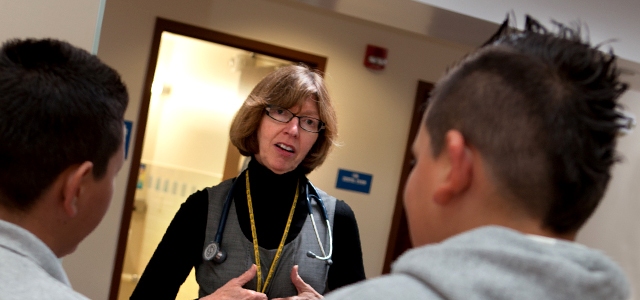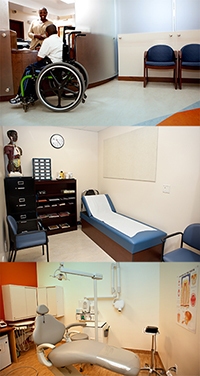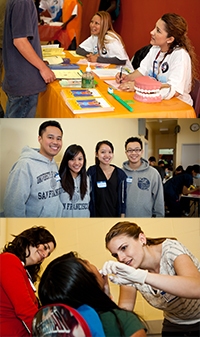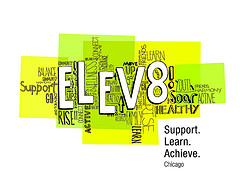Nursing and Dental Faculty and Students Engage in Oakland School-Based Clinics
Resource type: News
UCSF Science of Caring | [ View Original Source (opens in new window) ]

Karen Duderstadt with students at James Madison Middle School (photo by Elisabeth Fall)
By Martha Ross
Two eighth-graders come running into the health clinic at James Madison Middle School in East Oakland. The boys have an emergency of sorts. They want to know if they can borrow stethoscopes. Standing at the reception desk, they explain to Interim Clinic Manager Judy Caballeros and UCSF School of Nursing Clinical Professor Karen Duderstadt that they want to listen to the heartbeats of classmates sitting, exercising and playing video games. The experiment is for their eighth-grade science class.
“Do you know how to listen to a heartbeat?” asks Duderstadt. She is also a pediatric nurse practitioner (PNP) and works in the Madison clinic on Thursdays.
The boys smile and nod when Duderstadt offers to give them an impromptu lesson in finding the best places on the chest to hear a heartbeat. “Start right here in your rib cage,” she says. One of the boys giggles as Duderstadt, with a gentle voice and friendly manner, guides his hand along his sternum and over to different spots along his chest.
In this moment, Duderstadt isn’t just giving these boys a physiology lesson. She is showing them there is nothing frightening about talking to a health care professional – whether the topic is a class project or a more personal and serious health issue – and serving as a role model for a career in health care.
UCSF Joins the Elev8 Initiative
Duderstadt is among more than 60 UCSF faculty and nurse practitioner and dental students who began going into health centers and classrooms at Oakland middle schools during the 2011-2012 school year. Their work is part of a national initiative called Elev8, which has programs in Baltimore, Chicago, New Mexico and Oakland, all of which are funded by The Atlantic Philanthropies and local partners. The idea is to bring together schools, families and communities in a variety of ways to help middle school students stay healthy and engaged in learning as they make the transition from childhood to adolescence.
 UCSF received a three-year, $1.75 million grant from The Atlantic Philanthropies to create UCSF’s Elev8 Healthy Students and Families project within the Elev8 Oakland program. Elev8 Oakland launched in 2008 and represents a partnership among the Oakland Unified School District, Alameda County and nonprofit and community-based partners, such as Safe Passages and UCSF’s Elev8 Healthy Students and Families project.
UCSF received a three-year, $1.75 million grant from The Atlantic Philanthropies to create UCSF’s Elev8 Healthy Students and Families project within the Elev8 Oakland program. Elev8 Oakland launched in 2008 and represents a partnership among the Oakland Unified School District, Alameda County and nonprofit and community-based partners, such as Safe Passages and UCSF’s Elev8 Healthy Students and Families project.
Health center facilities include exam rooms for physicals, dental screenings and teeth cleaning.A major piece of the Oakland-UCSF effort is to increase the sustainability of newly established health centers at five middle schools: Madison,Roosevelt, United for Success Academy, West Oakland and Havenscourt. Using a “one-stop shop” approach, these clinics provide primary health care, including dental care, to students. Clinic staff also work with families, offering them health care or getting them connected to insurance, mental health, and employment and housing services.
Over the three-year grant period, UCSF nursing and dental school faculty and students will enhance and expand services at these centers. They will boost staffing levels, provide technical assistance on best practices, work with the Elev8 partners on increasing dental screening and health education and help the centers develop ways to increase their patient capacities and become financially sustainable.
A Driving Need at a Crucial Time
More than 1,600 students attend Elev8 schools, which are located in densely populated, racially and ethnically diverse neighborhoods beset by high levels of poverty, unemployment and juvenile arrests. Many students speak languages other than English and suffer chronic health problems. They also wrestle with concerns about safety, substance abuse and violence in their homes or on the streets.
Yet the centers at Madison and at United for Success are bright and spacious, with exam rooms for physicals, dental screenings and teeth cleaning, and laboratories for testing cholesterol and blood sugar levels. Students come in for a variety of complaints: scrapes in PE, allergies, stomachaches and flu symptoms. Teachers might refer students whom they suspect have vision or hearing problems. Clinic staff also monitor students with chronic conditions such as asthma; at Madison, up to 30 percent of the 327 students have asthma, says School Nurse Wanetta Daniel.
Most middle and high school students are healthy, says Zena Harvill (MS 2011), who works as a pediatric nurse practitioner for Oakland’s Native American Health Center, which runs the United for Success center. “But so much can happen between eighth and ninth grade.”
Research shows that children moving from childhood to adolescence start to solidify attitudes and make choices about health and lifestyle that could have lifelong consequences – whether they want to try drugs or become sexually active and whether they see themselves finishing high school and going on to college – according to the 2009 Public/Private Ventures report Paving the Way for Success in High School and Beyond: The Importance of Preparing Middle School Students for the Transition to Ninth Grade.
“It’s such a crucial time,” says Harvill. “A lot of what they need is psychosocial support. I feel it’s important to give them messages about how to take care of themselves.”
Naomi Schapiro directs the UCSF Elev8 project. A clinical professor of nursing and a pediatric nurse practitioner, Schapiro has worked in public health and with children and adolescents for most of her career. She notes that death rates for young people increase dramatically around age 15. The leading causes are accident, homicide and suicide. The hope is that during routine physicals, nurses and doctors can ask the right questions to discover whether a student is stressed out by family issues, depressed or engaging in behavior that can lead to drug use, violence or other life-threatening situations.
But it’s not easy. Harvill has learned that middle school students have a roundabout way of talking about things that really worry them.
“Sometimes it’s really hard to figure out what they need; they don’t quite articulate it. They’re too embarrassed to say what is really on their mind,” she says. “I’ll be working with a student, and I won’t know what they want until the very last minute of the visit.”
Yet something is definitely working. By the end of this school year, both the Madison and United for Success clinics had seen an upswing in students dropping in for appointments or just to chat with staff. On one morning at the United for Success center, a group of boys sat in the reception area, some clustered around one boy’s iPhone, which was playing music. One eighth-grader said he wanted to get information about condoms.
“That is why we’re here. We want kids to feel comfortable coming to the clinic and asking questions. We want them to feel empowered and to get good information,” Harvill says.
Into the Classrooms
Going into Elev8 schools also provides UCSF nursing and dental students with valuable learning opportunities on a number of levels, says Schapiro.
 Elev8 relies on the coordinated efforts of medical and dental practitioners, teachers, mental health counselors, family outreach workers and other professionals. The UCSF students will participate in an integrated, interdisciplinary model of dispensing health care.
Elev8 relies on the coordinated efforts of medical and dental practitioners, teachers, mental health counselors, family outreach workers and other professionals. The UCSF students will participate in an integrated, interdisciplinary model of dispensing health care.
UCSF nursing and dental students at Roosevelt Middle SchoolIn late May, for example, at Roosevelt Middle School, 10 second-year dental students and four nurse practitioner students worked together to screen students for cavities and other oral diseases, which are leading chronic diseases among children. The event gave UCSF students a chance to see oral health as an important focus of primary health care – and is one of many opportunities the program affords for UCSF dental and nursing students to engage in interdisciplinary education.
In addition, UCSF students will interact directly with sixth- through eighth-grade patients from diverse backgrounds, seeing these children at a crucial stage of their development.
At a “Take Back the Tap” presentation – about the benefits of drinking tap water – in an eighth-grade science class at Madison, PNP students practiced sharing important health information with 13- and 14-year-olds who were at turns shy, fidgety, boisterous or totally engaged. The nursing students guided the eighth-graders in an experiment – dropping eggs into jars of vinegar – so they could see for themselves how fluoride protects teeth from decay and cavities.
Half the eggs were coated in fluoride. Any fidgeting quieted as the 26 eighth-graders intently watched bubbles form more quickly around some eggs than others. Prompted by simple questions about what they were observing, some children made notes in their work sheets, but others were happy to announce their conclusions to the entire class. “Like they both started to bubble, but the one with the fluoride took longer,” one boy said.
“It’s important for students in the PNP program to see how kids really are, in a setting they regard as safe,” Schapiro says. Typically, opportunities for nursing students to interact with children are in hospitals, where the kids are sick, bored or scared. School, on the other hand, “is such a natural setting.”
This natural setting winds up being a win-win for everyone involved, says Madison Middle School Principal Lucinda Taylor. “By providing these services, UCSF and Alameda County are making a real contribution to a community that has been historically underserved.”
Elev8 and UCSF are Atlantic grantees.
Read More
>Finding Her Own Path to Nursing
To Learn More about Elev8:
> Visit our Elev8 page for videos and updates
> Visit www.elev8kids.org or the websites of the local initiatives:
Elev8 Baltimore
Elev8 Chicago
Elev8 New Mexico
Elev8 Oakland
Elev8 and UCSF are grantees of Atlantic’s Children & Youth programme in the United States, which funds efforts to support and expand community schools.
